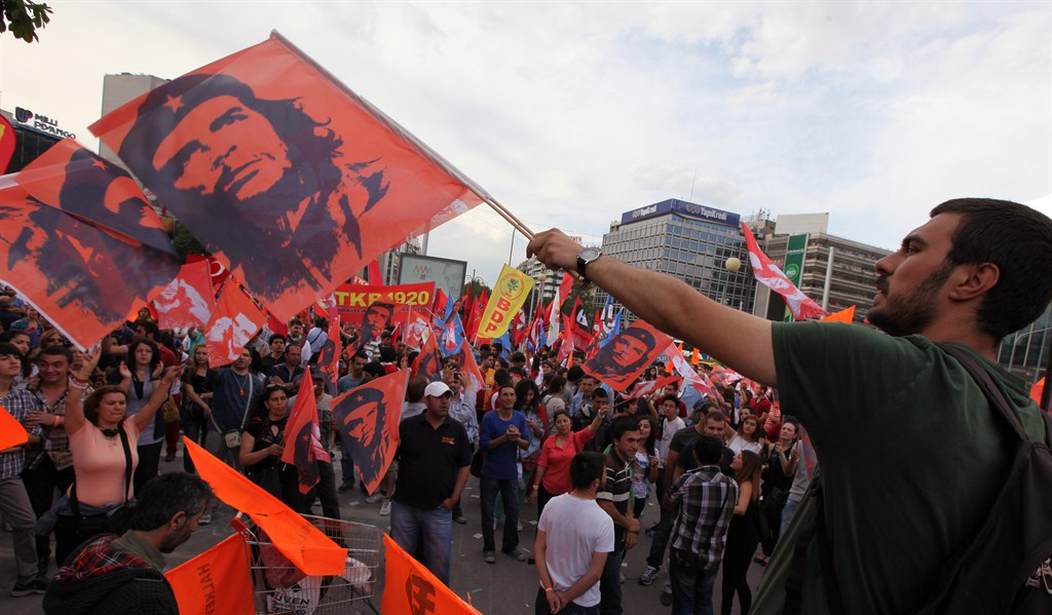At a ceremony in Havana last week, UNESCO (U.N. Educational, Scientific, and Cultural Organization) honored Che Guevara by enshrining his writings in its hallowed “Memory of the World Register.” The ceremony included several members of Ernesto “Che” Guevara’s family.
“UNESCO’s work is part of our support for freedom of expression as an inalienable human right set down in Article 19 of the Universal Declaration of Human Rights,” declares the UN’s mission statement.
But not far from where this UNESCO/Guevara ceremony took place Cubans were being starved and beaten in pestiferous torture chambers for the crime of quoting the UN Declaration of Human Rights in public.
“UNESCO is known as the intellectual agency of the United Nations while “Protecting freedom of expression: an essential condition for democracy, development and human dignity,” reads the UN charter.
But not far from where this UNESCO/Guevara ceremony took place, the regime being honored by UNESCO burned hundreds of books and documents in a ceremony only slightly less spectacular than the one hosted by Joseph Goebbels in Berlin’s Opera Square in 1933. The bonfire was accompanied by the beating and jailing of the owners and purveyors of these works. The Castroite bonfire was fueled by such works as Orwell’s Animal Farm, the works of Martin Luther King, and the UN Declaration of Human Rights.
“I plead with Fidel Castro and his government to immediately take their hands off (Cuba’s) independent librarians” pleaded none other than Ray Bradbury at the time. “And to release all those librarians in prison, and to send them back into Cuban culture to inform the people.”
Instead of heeding Bradbury, for the crime of stocking some of the world’s bestselling books, (along with the UN Declaration of Human Rights) the Stalinist regime honored by UNESCO condemned the Cuban librarians to prison terms similar to the one a South African judge handed Nelson Mandela for planting bombs in public places. “As to the disposition of the books, magazines and pamphlets they are to be destroyed by means of incineration because they lack usefulness,” ruled the Castroite “judge.”
Recommended
Just last week, the UN honored Nelson Mandela with an “International Nelson Mandela Day.” The longest suffering political prisoners in modern history (all Cubans jailed and tortured by the regime honored by the UN last week) have never received so much as a nod or wink from the United Nations.
“As the United Nations agency with a specific mandate to promote 'the free flow of ideas by word and image,' UNESCO works to foster free, independent and pluralistic media in print, broadcast and online. This foundation is why UNESCO today promotes policies for press freedom and the safety of journalists,” reads the UNESCO charter.
But the regime honored by UNESCO last week also holds the honor, according to the Paris-based “Reporters Without Borders," of jailing and torturing the most journalists per-capita on earth. Stunningly, the total number of journalists jailed by the nation honored by UNESCO (pop. 11 million) is only slightly behind that of China (pop. 1.4 billion!)
“Our purpose is to contribute to peace and security by promoting international collaboration through education, science, and culture in order to further universal respect for justice, the rule of law, and human rights along with fundamental freedom,” declares the UNESCO charter.
“We reject any peaceful approach!" declared the man they honored last week in Havana. “Violence is inevitable! To establish Socialism rivers of blood must flow! If the nuclear missiles had remained (in Cuba) we would have fired them against the heart of the U.S. including New York City. The victory of socialism is well worth millions of atomic victims!”
“My nostrils dilate while savoring the acrid odor of gunpowder and blood. Crazy with fury I will stain my rifle red while slaughtering any surrendered enemy that falls in my hands! We must keep our hatred alive and fan it to paroxysm!” This passage, by the way, comes from the very works enshrined and honored by UNESCO last week.
The “acrid odor of gunpowder and blood” rarely reached Che Guevara’s nostril from actual combat. It always came from the close-range murder of bound, gagged or blindfolded men (and boys).
Rigoberto Hernandez was 17 when Che's soldiers dragged him from his cell in La Cabana, jerked his head back to gag him, and started dragging him to the stake. Little "Rigo" pleaded his innocence to the very bloody end. But his pleas were garbled and difficult to understand. His struggles while being gagged and bound to the stake were also awkward. The boy had been a janitor in a Havana high school and was mentally retarded. His single mother had pleaded his case with hysterical sobs. She had begged, beseeched and finally proven to his "prosecutors" that it was a case of mistaken identity. Her only son, a boy in such a condition, couldn't possibly have been "a CIA agent planting bombs."
"FUEGO!" and the firing squad volley shattered Rigo's little bent body as he moaned and struggled awkwardly against his bounds, blindfold and gag. “Certainly we execute!” boasted the man honored by UNESCO last week. “And we will continue executing as long as it is necessary!” Those executions (murders, actually; execution implies a judicial process) had reached about 16,000 by the time of Che Guevara’s boast, the equivalent, given the relative populations, of almost a million executions in the U.S. (This figure comes from The Black Book of Communism, by the way, written by French scholars and published in English by Harvard University Press, neither an outpost of “right-wing Cuban exiles.”)
Quite fittingly, Che’s bloodthirsty boast was made on Dec. 9, 1964, while addressing the hallowed halls of the United Nations.

























Join the conversation as a VIP Member